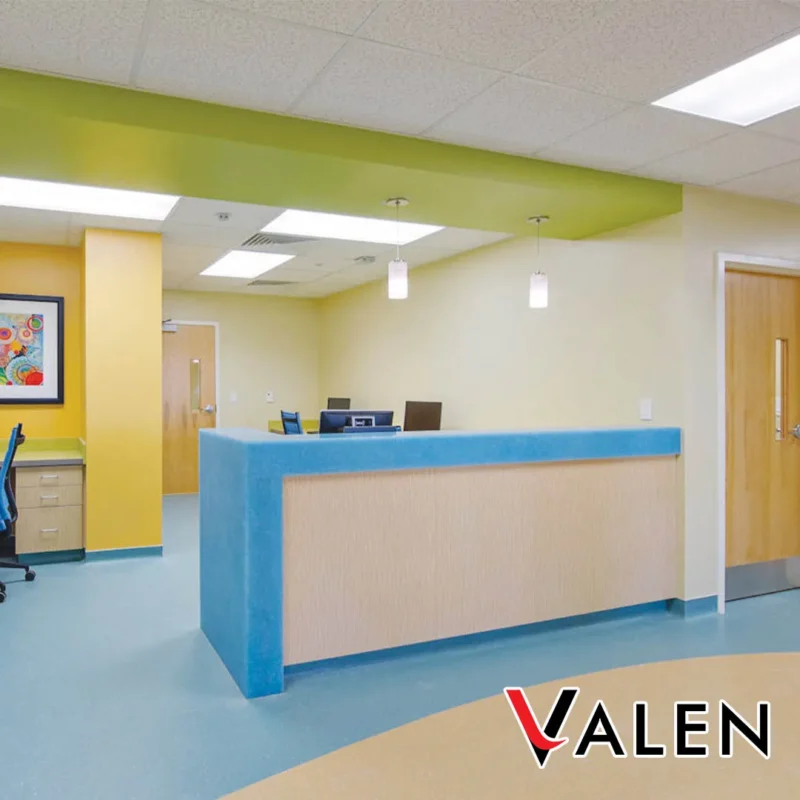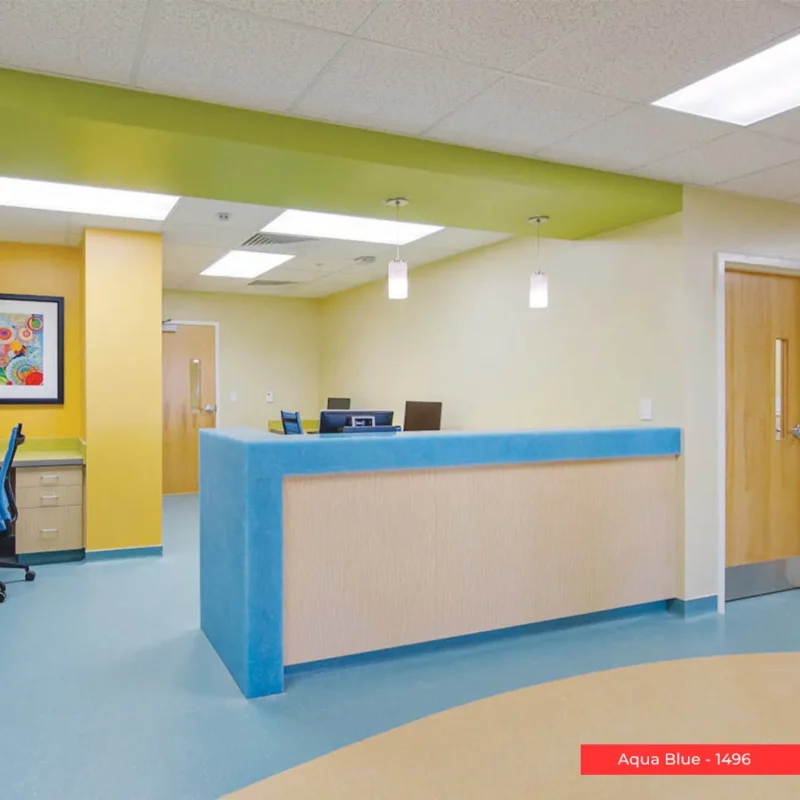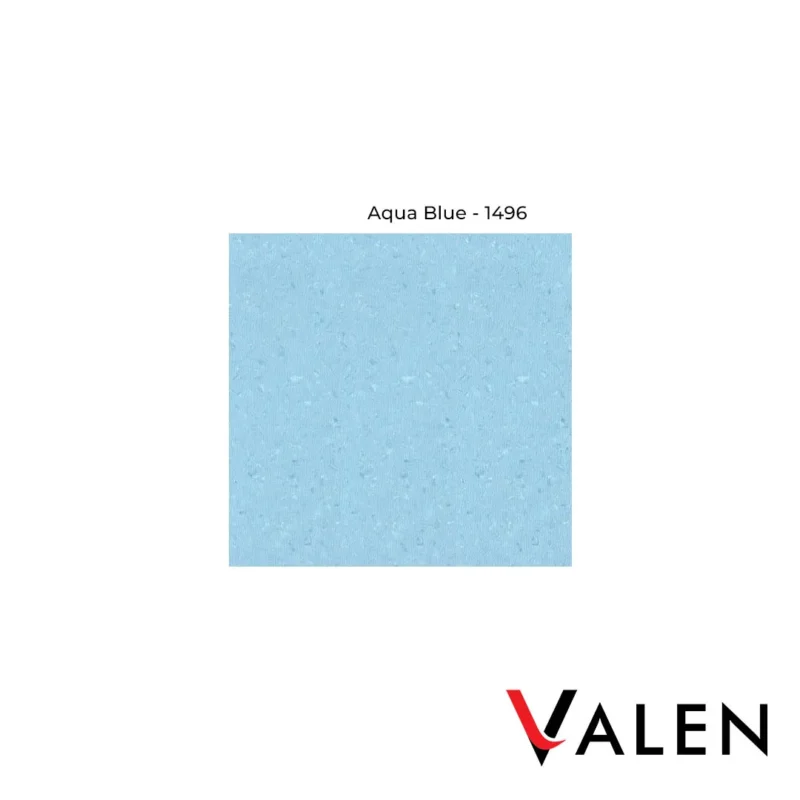Outstanding Antibacterial Flooring Hospitals | Aqua Blue – 1496 | VALEN Vinyl Roll
Antibacterial flooring hospitals help prevent the growth of harmful bacteria, ensuring a safer environment. Hospital vinyl flooring prices vary depending on the material’s quality and antibacterial properties.
Antibacterial vinyl flooring for hospitals is specifically designed to provide hygiene benefits while being easy to maintain.
Hospital-grade antibacterial flooring offers high durability and meets strict health standards, ensuring long-lasting protection.
Primelay provides reliable antibacterial flooring solutions tailored to healthcare environments.
7 Applications of Antibacterial Flooring in Hospitals
Antibacterial flooring is being more widely adopted in hospitals to uphold strict hygiene standards, limit infection transmission, and safeguard both patients and healthcare personnel. Here are seven important applications of antibacterial flooring in medical facilities:
-
Operating Rooms
In operating theaters, the importance of strict hygiene protocols cannot be emphasized enough. Antibacterial vinyl flooring is essential in these clean environments, as it helps lower the risk of infections. This type of flooring inhibits the development of bacteria that might contaminate wounds during surgical procedures. Moreover, the smooth design of the flooring guarantees that there are no seams or joints where bacteria could conceal themselves, facilitating more effective disinfection by cleaning personnel. The long-lasting surface withstands stains and liquid spills, stopping any possible risks or contamination sources.
-
Patient Rooms
Hospital rooms where patients are recuperating from surgery or treatment need constant focus on cleanliness. Antibacterial flooring minimizes the risk of hospital-acquired infections (HAIs), which may hinder recovery. This kind of flooring is particularly advantageous for individuals with compromised immune systems, like those receiving chemotherapy or organ transplants. The antibacterial flooring used in hospitals inhibits bacterial growth, thus promoting a safer and cleaner atmosphere for patients. Additionally, its simple cleaning properties allow for quick resolution of spills or dirt, guaranteeing that the room stays sanitary consistently.
-
Intensive Care Units (ICU)
ICUs are critical zones where patients frequently face various health issues and are extremely susceptible to infections. Antibacterial hospital flooring is essential in these settings as it offers a surface that not only deters bacterial proliferation but also endures the rigorous cleaning methods required for infection prevention. The flooring withstands bodily fluids, medications, and different cleaning chemicals utilized in ICUs. Additionally, the non-porous surface stops moisture from being absorbed, ensuring that bacteria and other pathogens do not penetrate the floor, which aids in preserving a clean environment.
-
Hospital Corridors
Hospitals are bustling environments with ongoing movement from patients, personnel, and guests. Antibacterial vinyl flooring in hallways aids in reducing the transmission of bacteria across the hospital. In busy areas, the chance of contamination increases, but antibacterial flooring helps control harmful pathogens effectively. The flooring’s antimicrobial features are particularly successful at hindering bacterial growth from spilled liquids, soiled shoes, or medical fluids commonly present in these zones. Moreover, its ease of cleaning and maintenance contributes to keeping hospital corridors clean and secure.
-
Emergency Rooms (ER)
The emergency room frequently has high stress levels and sees a constant influx of patients. In these scenarios, prompt and effective cleaning is crucial for upholding hygiene. Antibacterial vinyl flooring is essential for maintaining the ER’s safety for both patients and staff. The capacity of the floor to endure frequent cleaning with potent disinfectants is crucial in this dynamic setting. Furthermore, the even, glossy surface of the vinyl aids in minimizing the chances of bacteria or contaminants becoming lodged in cracks, which could otherwise present an infection hazard to patients.
-
Laboratories and Research Areas
In hospital labs and research centers, maintaining cleanliness is essential for the validity of experiments and the safety of staff. Antibacterial flooring safeguards laboratory equipment and researchers by stopping the contamination of delicate materials. The flooring can withstand spills, including chemicals and biological substances that might be found in these areas. Due to its non-porous surface and easy-to-clean nature, it can be swiftly disinfected without the danger of bacterial development, ensuring a sterile environment that is crucial for both research precision and safety.
-
Hallways and Waiting Rooms
While they may not be as vital as operating rooms or ICUs, hospital waiting areas and corridors still demand meticulous attention to cleanliness. These areas experience heavy foot traffic, allowing germs and bacteria to be easily transmitted. Implementing antibacterial flooring in these shared spaces decreases the chances of bacteria remaining and being transported to more vulnerable areas. The simple upkeep and sanitation of the flooring allow hospitals to keep a tidy, welcoming environment for patients, visitors, and staff. By utilizing antibacterial flooring, hospitals can guarantee that communal spaces stay safe and clean.
Pros of VALEN Antibacterial Flooring Hospitals
✅ Reduces infection risk
✅ Easy to clean
✅ Durable
✅ Stain resistant
✅ Slip resistant
✅ Cost-effective
✅ Hygienic
✅ Environmentally friendly
✅ Long-lasting
✅ Variety of designs
FAQs on VALEN Antibacterial Flooring Hospitals
What is antibacterial flooring hospitals?
Antibacterial flooring for hospitals is specifically created to prevent the proliferation of bacteria and other dangerous microorganisms. It offers a secure, sanitary atmosphere essential for healthcare facilities.
Why is antibacterial flooring important in hospitals?
Hospitals need flooring that helps minimize the transmission of infections. Antibacterial flooring inhibits the accumulation of bacteria, promoting a cleaner and safer setting for patients, personnel, and guests.
What are the benefits of antibacterial flooring hospitals?
These surfaces provide improved cleanliness, simple upkeep, and long-lasting strength. They withstand stains, spills, and heavy foot traffic, which makes them perfect for highly sterile settings such as hospitals.
How do I clean antibacterial flooring hospitals?
It is advised to regularly clean with a gentle disinfectant and mop. The antibacterial features of the flooring assist in diminishing the likelihood of infections and simplify maintenance.
Why choose Primelay for antibacterial flooring hospitals?
Primelay offers premium antibacterial flooring options specifically designed for healthcare settings. Their flooring blends robustness, sanitation, and cutting-edge antimicrobial technology, guaranteeing a secure and hygienic environment.














